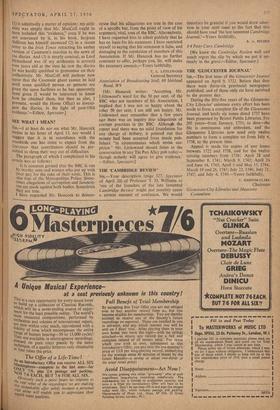SEE WHAT 1 MEAN?
SIR,—I at least do not see what Mr. Hancock means in his letter of April 13, nor would I suggest that it is in accordance with the standards one has come to expect from the ,spectator that contributors should be per- mitted to shrug their way out of difficulties.
The paragraph of which I complained in his article was as follows: It is common ground that the BBC is run by worthy men and women who put up with poor pay for the sake of their souls. This is also true of the Metropolitan Police. Some- !lines allegations of corruption and favourit- ism are made against both bodies. Sometimes the are true.
I hay ve requested Mr. Hancock to demon- strate that his allegations are true in the case of a specific but, from the point of view of his argument, vital, area of the BBC. Alternatively, 1 have requested him to admit publicly that he has no basis for his statement. I have restricted myself to saying that his statement is false, and damaging to the reputation of members of this Association. If Mr. Hancock has no further comment to offer, perhaps you. Sir, will make the necessary amende.—Yours faithfully,
T. L. LITTLEWOOD General Secretary Association of Broadcasting Stall, 69 Shirland Road. W9
[Mr. Hancock writes: 'Accepting Mr. Littlewood's word for the 50 per cent. of the BBC who are members of his Association, I implied that I was not so happy about the other 50 per cent. I am still not happy. Mr. Littlewood may remember that a few years ago there was an inquiry into allegations of corrupt practices in the BBC. Although the report said there was no solid foundation for any charge of bribery, it pointed out that money had been accepted from music pub- lishers "in circumstances which invite sus- picion." Mr. Littlewood should listen to the conversation in any Tin Pan Alley pub today— though nobody will agree to give evidence.' —Editor, Spectator.]










































 Previous page
Previous page